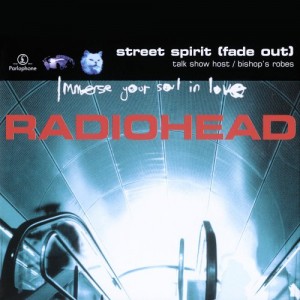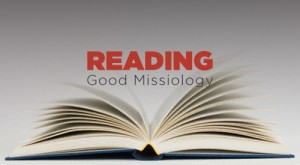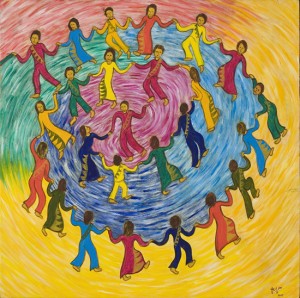Tip: Put on Radiohead’s “Street Spirit (Fade Out)” then listen to “Karma Police” while reading this blog entry.

This machine will, will not communicate
These thoughts and the strain I am under
Be a world child, form a circle
Before we all go under
And fade out again and fade out again
Cracked eggs, dead birds
Scream as they fight for life
I can feel death, can see its beady eyes
All these things into position
All these things we’ll one day swallow whole
And fade out again and fade out again
~ Radiohead, “Street Spirit [Fade Out]â€
Thom Yorke Says We’re Dogs (and he’s right)
Commenting on “Street Spiritâ€, Thom Yorke, lead singer of Radiohead, says: “All of our saddest songs have somewhere in them at least a glimmer of resolve… ‘Street Spirit’ has no resolve… It is the dark tunnel without the light at the end. It represents all tragic emotion that is so hurtful that the sound of that melody is its only definition.â€[1] The song has been summarized as both “Hopelessness†and Radiohead’s “purest song.†The music delivers a message of pure hopelessness and futility—strain, fading life, swallowed whole, death.
You might say that “Street Spirit” is the futility of a life lived without the Spirit of Heaven. It is life without life, an absence of the animating spirit of God who restores us our humanity. Without the Spirit, life becomes an impersonal machine that doesn’t impart hope. We go through the motions of work, play, and family without any connection to God. Whether we acknowledge it or not, a life disconnected from the Spirit is the dark tunnel of a hopeless life. Yorke comments: “We all have a way of dealing with that song… It’s called detachment.†That’s exactly what many of us do with the hopelessness of our disconnected lives. We detach from reality, from our strained, fading relationship with God. We all detach.
All too often we look to entertainment and media, not for life-giving leisure but for life-denying escape.
How do you detach? Many of us detach ourselves from reality through entertainment and we drag our children with us. As the world becomes a stressful place, we run to entertainment not to the Spirit. Media becomes our savior, rescuing us from our demanding or despairing days. After a demanding day, during a season of suffering, or in search of fulfillment somewhere other than God. These days have a way of building up over years, tipping over into the sense that our lives are profoundly hollow, disconnected, and lifeless. We abdicate parenting to dvds, television, computer games, twitter, Facebook, and MySpace.
What are we living for? In a moment of honesty, we might acknowledge this, the beady eyes of death penetrating our souls, but more often, we cover up our hopelessness with a new music download, some mindless internet surfing, social networking, or just one more Netflick. The media signal gets stronger; the Spirit fades.
Commenting on his experience of playing “Street Spirit†live, Yorke compares his smiling, cheering fans to a dog who gleefully wags his tail just before he is put down. We are the fans, and the fans don’t even think about what they are singing. They just sing; they just watch, killing themselves softly. We are detached. All too often we look to entertainment and media, not for life-giving leisure but for life-denying escape. In the words of Neil Postman, we are entertaining ourselves to death.
Watching 24 Will Inspire & Kill You
Surely you’ve felt this, this gnawing sense that you just wasted part of your life while you were surfing, streaming, watching? I recently started watching the TV Series “24†to wind down in the evenings, but its become much more than winding down. It’s addictive. Just one more episode, and it’s so easy on Netflix. Why?
Well, the story is incomplete and the suspense kills me. They frame my suspense with a 24 hour clock that counts down in each episode, prodding me to the next. There’s a good reason for the addiction—part of us that longs to participate in a meaningful story and see it to the end. We want to participate in bringing Serbian hitmen down, to see CTU/Center for Terrorist redeemed from its corruption, and, perhaps most of all, to experience the restoration and healing of the Bauer family. Jack Bauer, the director of CTU has fractured his family through overworking and an extra-marital affair. He’s trying to repair things. We long for restoration with Jack. That’s the good reason we keep watching 24.
We distract ourselves from the real story of our lives by escaping into the fictional story of other’s lives.
But there’s also a bad reason, another part of us that wants to be distracted from the real injustice (homeless and poor of our cities), real need for restoration and healing (of our broken, disconnected, overworked lives). The story of 24 (or any form of entertainment) can become an escape from the real injustice and brokenness of our everyday lives. We will empathize with Jack & Terry while we neglect our own marriages.
We will be angered by betrayal in CTU but undisturbed by the poverty in our very own city. And then there’s the brokenness and hopelessness of our own lives. We cover it up with escapist stories, stories that we don’t even really reflect on. We distract ourselves from the real story of our lives by escaping into the fictional story of others’ lives. The media signal gets stronger; the Spirit fades. But if we would stop and listen to these stories, not just watch them, we would detect an echo of our own lives. A deep down longing for attachment not detachment, justice not entertainment, life not death. Escape your escape and jack into the Spirit of life, recover your humanity, not only for your own sake but for the sake of your children.
[1] Thom Yorke – http://radiohead1.tripod.com/songs/album/streetspirit.htm


